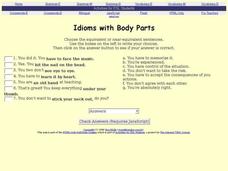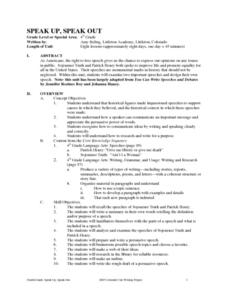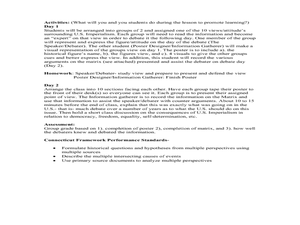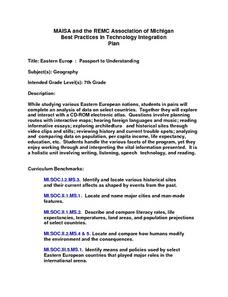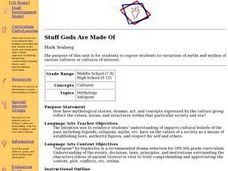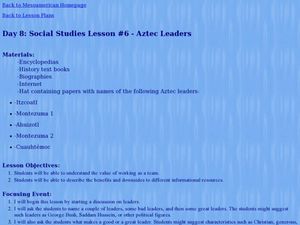Curated OER
Let Me Convince You
Students discuss the purposes of persuasive speaking and writing with emphasis upon what makes them different from other kinds. They brainstorm and discuss ways to select "The Greatest American Who Ever Lived" and prepare a persuasive...
Curated OER
Alien Whispers
In this simile activity worksheet, students describe the aliens they have seen on another planet using similes. Students describe in 20 different categories.
Curated OER
Spanish & Chicano English
Learners examine the history of Spanish in what is now the United States. They examine the current language status of the Hispanic population. Students are able to characterize Spanglish and Chicano English. They examine some features...
Curated OER
Poetry Elements
Need a quick review of some of the elements of poetry? Eleven key terms are defined and illustrated.
Curated OER
Idioms with Body Parts
In this idiom worksheet, students match bolded idioms in sentences with their meaning. Students may click an "answer" button for immediate feedback, worksheet is labeled ESL but is not exclusive.
Curated OER
Speak Up, Speak Out
Fourth graders examine, compare, and summarize the speeches of Sojourner Truth and Patrick Henry. They review the parts of a good speech and design and give their own speech that expresses an opinion and persuades the listener..
Curated OER
Wall of Philanthropists: King Day (7th)
Students recognize the importance of justice, tolerance, equality, and historical figures. In this philanthropic actions lesson, students study the philanthropic actions of historical figures, and learn about the concepts of fairness,...
Curated OER
Environmental Health Impromptu Talk
Young scholars learn the criteria for and create the framework of an impromptu speech about an environmental health issue that is especially important to them. Students write a speech about an environmental health problem based on the...
Curated OER
Views Concerning U.S. Imperialism after the Spanish-American War
Students research the impact of American Imperialism. In this Spanish-American War lesson plan, students visit the listed Web sites to discover details about the war and its effects. Students use the information they locate to...
Curated OER
Those Cells Look Good Enough to Eat
Students explore the parts of the cell. In this cell lesson, students use foods to create cell models that represent the nucleus, cytoplasm, cell membrane, mitochondria, ribosomes, vacuoles, endoplasmic reticulum, and Golgi bodies...
Curated OER
Lesson 5-Elaborate/Evaluate Too Loud, Too Close, Too Long
Students begin with an analysis of loudness. They estimate the loudness of common environmental sounds, and then use their knowledge of hearing and loudness to evaluate the risk of noise-induced hearing loss for fictitious individuals....
Curated OER
To Be Or Not To Be: Reading With Expression
Students observe and demonstrate a variety of strategies for reading with expression. They listen to the teacher read "Jabberwocky" by Lewis Carrol with and without expression, and discuss the differences. In small groups they...
Curated OER
Budgeting for Peace
Students explore world leader's quests for peace. In this world leader research lesson, students read a speech by Archbishop Desmond Tutu and view budget figures for the United States. Students work in groups to create an alternate...
Curated OER
Most Wanted Villians
Students review the characteristics of various characters in fairytales. As a class, they review the story details and create a concept map using a software program. They create their own wanted poster of the villians in the fairytale to...
Curated OER
Word Art with King's Words
Students investigate equality and racism by creating a word art project. In this civil rights instructional activity, students discover the life of Martin Luther King Jr. and create a word art project using the Internet site Wordle...
Curated OER
To Kill a Mockingbird by Harper Lee: Vocabulary
In this vocabulary skills worksheet, students review the listed terms and figures related to Harper Lee's To Kill a Mockingbird. Students may also access an online quiz on the selection using the link at the bottom of the page.
Curated OER
Find the Word That Doesn't Belong
Students, after listening the "My Hero" story, are given four words in which they have to figure out which one does not belong with the others.
Curated OER
Eastern Europe: Passport to Understanding
Seventh graders explore Eastern Europe. They analyze data on select countries. Students prepare a short oral presentation on the country they researched. They locate their country using an interactive map.
Curated OER
Stuff Gods Are Made Of
Students examine different myths of various cultures around the world. Using artwork, they discuss the artistic designs and develop hypothesize about their importance. They use the internet to research myths they are aware of and share...
Curated OER
Method for Teaching the Blending of Sounds: Train Technique
Students explore the blending of individual sounds to make words and, using visuals and manipulatives, equate this process to the hooking up of railroad cars to make a train. They link individual letters/sounds to make short words.
Curated OER
Puritans Lesson Plan
Students determine if the Puritans were selfish or selfless. In this American history lesson, students read two Puritans documents, answer guiding questions on a worksheet, and use evidence from the documents to write whether the...
Curated OER
Aztec Leaders
Students research the accomplishments of Aztec leaders. In this early civilizations lesson, students research Itzcoatl, Montezuma I, Ahuizotl, Montezuma II, and Cuaucht moc. Students use their research findings to create presentations.
Curated OER
Verb Phrases
This worksheet tackles the topic of verb phrases by providing an explanation of a verb phrase followed by several examples of verb phrases and their meanings. Students complete fill in the blank sentences with the correct verb phrase.
Curated OER
Adjectives
In this adjectives learning exercise, 3rd graders, working in groups of two or three, utilize a cats poster to explore the world of adjectives. Students study the poster and answer twenty-five questions associated with adjectives.






